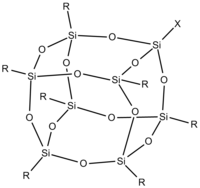Hydrogen silsesquioxane

Hydrogen silsesquioxane(s) (HSQ, H-SiOx, THn, H-resin) are inorganic compounds with the empirical formula [HSiO3/2]n. The cubic H8Si8O12 (TH8) is used as the visual representation for HSQ.[clarification needed] TH8, TH10, TH12, and TH14 have been characterized by elemental analysis, gas chromatography–mass spectroscopy (GC-MS), IR spectroscopy, and NMR spectroscopy.[1]
High purity semiconductor-grade HSQ has been investigated as a negative resist in photolithography and electron-beam (e-beam) lithography.[2] HSQ is commonly delivered in methyl isobutyl ketone (MIBK) and can be used to form 0.01–2 μm films on substrates/wafers. When exposed to electrons or extreme ultraviolet radiation (EUV), HSQ cross-links via hydrogen evolution concomitant with Si-O bond crosslinking. Recently, the possibility of crosslinking HSQ using ultrashort laser pulses through multiphoton absorption and its application to 3D printing of silica glass have been demonstrated.[3][4] Sufficiently dosed and exposed regions form a low dielectric constant (low-k) Si rich oxide that is chemically resistant/insoluble towards developers, such as tetramethylammonium hydroxide (TMAH). Sub-10 nm patterning is achievable with HSQ. The nanoscale patterning capabilities and low-k of the Si rich oxide produced is potentially of broad scope of nano applications and devices.[5]
HSQ has been available as 1 and 6% (wt%) MIBK solutions from Dow Inc. (Formally Dow Corning), called XR-1541-001 and XR-1541-006, respectively. HSQ in MIBK has a short shelf life. Alternatively, Applied Quantum Materials Inc. (AQM) produces HSQ with a longer shelf life.[6][7] AQM HSQ solutions are available in the United States from DisChem, Inc. EM Resist Ltd (UK) also manufactures and supplies HSQ worldwide both as powder and in solution.[1]
References
[edit]- ^ Agaskar, P. A.; Day, V. W.; Klemperer, W. G. (1987-09-01). "A new route to trimethylsilylated spherosilicates. Synthesis and structure of [Si12O18](OSiMe3)12, D3h-[Si14O21](OSiMe3)14, and C2v-[Si14O21](OSiMe3)14". Journal of the American Chemical Society. 109 (18): 5554–5556. doi:10.1021/ja00252a058. ISSN 0002-7863.
- ^ Namatsu, H.; Yamaguchi, T.; Nagase, M.; Yamazaki, K.; Kurihara, K. (1998-03-01). "Nano-patterning of a hydrogen silsesquioxane resist with reduced linewidth fluctuations". Microelectronic Engineering. International Conference on Micro- and Nanofarbication. 41–42: 331–334. doi:10.1016/S0167-9317(98)00076-8. ISSN 0167-9317.
- ^ Jin, Feng; Liu, Jie; Zhao, Yuan-Yuan; Dong, Xian-Zi; Zheng, Mei-Ling; Duan, Xuan-Ming (2022-03-15). "λ/30 inorganic features achieved by multi-photon 3D lithography". Nature Communications. 13 (1): 1357. Bibcode:2022NatCo..13.1357J. doi:10.1038/s41467-022-29036-7. ISSN 2041-1723. PMC 8924217. PMID 35292637.
- ^ Huang, Po-Han; Laakso, Miku; Edinger, Pierre; Hartwig, Oliver; Duesberg, Georg S.; Lai, Lee-Lun; Mayer, Joachim; Nyman, Johan; Errando-Herranz, Carlos; Stemme, Göran; Gylfason, Kristinn B.; Niklaus, Frank (2023-06-07). "Three-dimensional printing of silica glass with sub-micrometer resolution". Nature Communications. 14 (1): 3305. Bibcode:2023NatCo..14.3305H. doi:10.1038/s41467-023-38996-3. ISSN 2041-1723. PMC 10244462. PMID 37280208.
- ^ Chen, Yifang (2015-03-05). "Nanofabrication by electron beam lithography and its applications: A review". Microelectronic Engineering. 135: 57–72. doi:10.1016/j.mee.2015.02.042. ISSN 0167-9317.
- ^ Shen, Jiashi; Aydinoglu, Ferhat; Soltani, Mohammad; Cui, Bo (2019-03-01). "E-beam lithography using dry powder resist of hydrogen silsesquioxane having long shelf life". Journal of Vacuum Science & Technology B. 37 (2): 021601. Bibcode:2019JVSTB..37b1601S. doi:10.1116/1.5079657. ISSN 2166-2746. S2CID 104333826.
- ^ Jiashi, Shen (2018-09-28). E-beam Lithography using Dry Powder HSQ Resist Having Long Shelf Life and Nanogap Electrode Fabrication (Thesis).
Further reading
[edit]- Chen, Huiping; Tecklenburg, Ron E. (October 2006). "Characterization of low and intermediate molecular weight hydrogen silsesquioxanes by mass spectrometry". Journal of the American Society for Mass Spectrometry. 17 (10): 1438–1441. Bibcode:2006JASMS..17.1438C. doi:10.1016/j.jasms.2006.06.010. ISSN 1044-0305. PMID 16872839. S2CID 3674845.
- Frye, Cecil L.; Collins, Ward T. (1970-09-01). "Oligomeric silsesquioxanes, (HSiO3/2)n". Journal of the American Chemical Society. 92 (19): 5586–5588. doi:10.1021/ja00722a009. ISSN 0002-7863.
